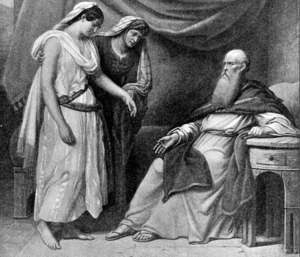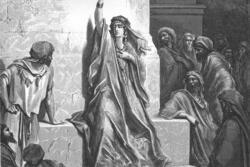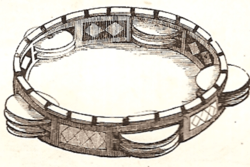Are You There God? It’s Me, Hagar
The late fall and early winter are my favorite parts of the year, but not because of the holiday parties, the possibility of snow, or the comfort of falling back into my normal routine at school. Rather, they are my favorite seasons because those are the parts of the Jewish year where we read what are, to me, some of the most compelling and interesting stories in the Torah. Late fall is when we return to the patriarchs’ stories in the book of Breishit (Genesis): the stories of Abraham, Isaac, and Jacob. And, as in any good family story, there is lots and lots of drama.
But the patriarchs do not act out their drama each fall without the involvement of the matriarchs. Most of the time when conflict happens, it’s a result of decisions made by Sarah, Rebecca, Rachel and Leah. The matriarchs are complex women, who do not always behave “perfectly,” or in the manner we would expect of our biblical female role models. Nowhere is this more apparent than in the story of Hagar, Sarah’s one-time slave, and Abraham’s one-time concubine.
The tale in Breishit 16 goes like this: Sarah can’t have children. In a world where the harsh desert lifestyle and God’s wrath threaten everyone’s lives daily, she knows that Abraham is going to need an heir sooner rather than later. So she tells Abraham to have a child with her maid Hagar instead. When Hagar turns up pregnant, she apparently makes it known that she wants to be treated as Sarah’s equal in the household. Sarah becomes angry and jealous. She lashes out at Abraham and Hagar, and ends up forcing Hagar to run away.
One problem: there’s nowhere to run to. Abraham and his family are strangers in a strange land, and there’s nothing but sheep and sand for miles. As a single woman, Hagar won’t last long in the wilderness. But as they so often do in these kinds of stories, an angel appears when Hagar is taking a break by a spring of water, and tells her that she’s going to have a son. God has listened to her suffering, and everything will be okay, but she should return to Abraham and Sarah and have her baby there. Hagar picks herself up from the ground to go do just that.
Generally when I read this story, I’m annoyed by this point. Who cares whether this woman dies in the desert or not? Why does she get addressed by an angel? Why does she get to have the child first? In my view, Hagar’s adventures are secondary to the main narrative, and I’m impatient to return to Sarah and Abraham’s struggles. My hand is already reaching to turn to the next page. But then Hagar does something that reminds me that every person in the Torah is there for a reason, and has something to teach me.
Before she goes home, Hagar does a very strange thing: she addresses God directly, with a name of her own choosing. “You are El-Roi,” she says, and the Torah adds a verse saying that this means, “Have I not gone on seeing after He saw me!” which doesn’t actually clear anything up. Hagar’s intended meaning is a mystery. Is she saying that God can see her? Or that she can see (or saw) God? Is the seeing in a literal or figurative sense? In Hagar’s time, it wasn’t a given that a deity would take direct notice of a man, let alone an Egyptian slave woman wholly outside the covenant Abraham is slowly building with God. That’s why it’s so important that Hagar, who has no reason to trust or talk with Abraham’s deity, feels confident enough to call God “El Roi”— “the God Who Sees Me.”
As author Charlotte Gordon points out in her book, The Woman Who Named God, “other people in Scripture…refer to God by the names He would teach them to use… but no one had ever invented their own, and no one else ever would.” Hagar, who has not interacted with God directly before, creates her own relationship with God simply through the power of naming.
Being able to name the things that are important to you can shape your relationship to them in ways that are hard to describe. I was past my bat-mitzvah when I first really listened to Hagar’s story, but I was in elementary school when I first learned that God has several different names in Jewish tradition. I remember that I thought some of them sounded prettier than others: “Adonai” was musical, but “Hashem” was rough and harsh, whereas “El-Shaddai” was mysterious and reminded me of the stillness of the desert at night. How I prayed or related to God depended a lot on what name I called God at any given time. Sometimes I felt limited by what the siddur (prayer book) gave me, and that in turn limited my desire to fully engage with Judaism. If I had known earlier that people could choose and create names for our deity based on their own personal experiences, I think I would have figured out how I wanted to practice my Judaism sooner. If I had heard Hagar’s story earlier, I think my relationship to God would be stronger now.
Even though Hagar wasn’t Jewish and is mostly ignored by our tradition after Abraham and Sarah have a son of their own, her story taught me to have confidence in my own beliefs. Hagar took a bold step in creating a name for God on her own, without input from or consideration for anyone else. She took charge of her relationship with God in a personal, and, to me, inspirational way. I’m the one who gets to determine what I believe and how I practice my Judaism. I’m the one who gets to decide whether I call God “God,” or “Hashem,” or “Adonai,” or—who knows—“El Roi.” Every time I read Hagar’s story, I’m reminded that I have the right and the responsibility to create my own relationship with God, even if others try to dictate what that relationship should be.
This piece was written as part of JWA’s Rising Voices Fellowship.







